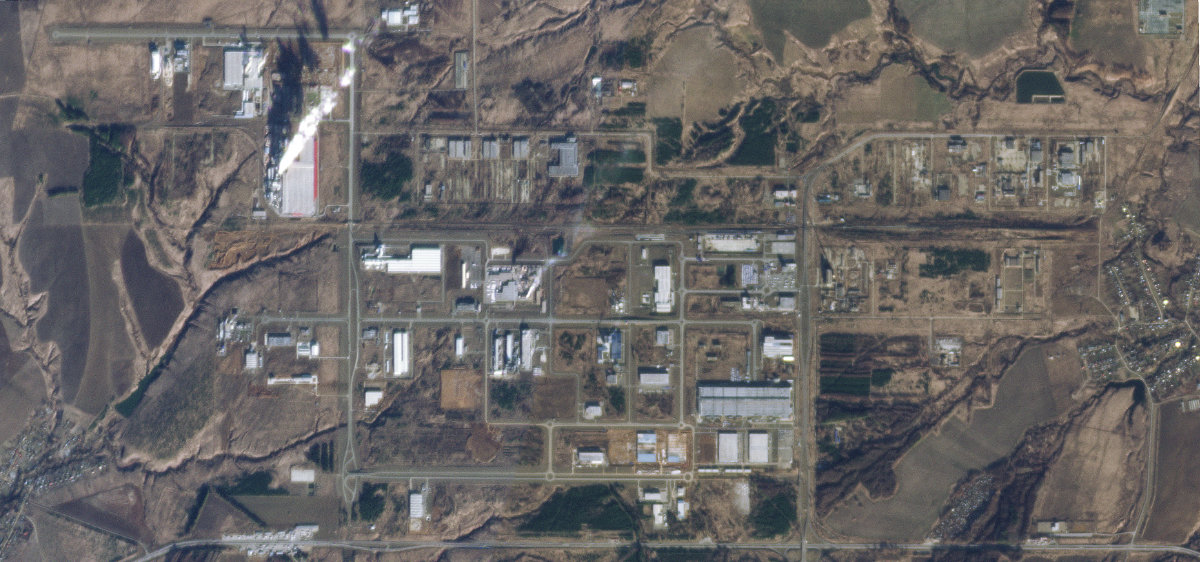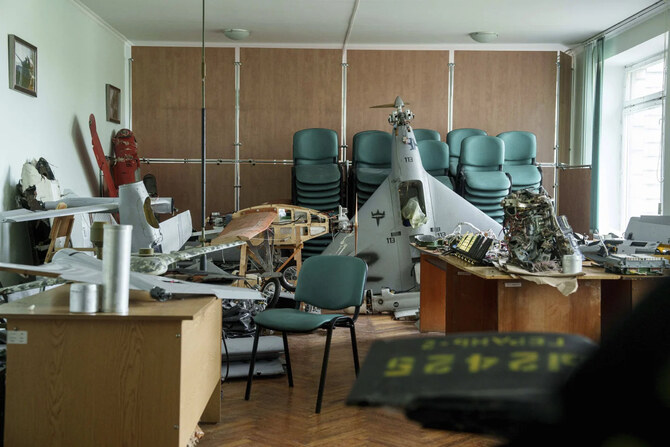The social media ads promised the young African women a free plane ticket, money and a faraway adventure in Europe. Just complete a computer game and a 100-word Russian vocabulary test.
But instead of a work-study program in fields like hospitality and catering, some of them learned only after arriving on the steppes of Russia’s Tatarstan region that they would be toiling in a factory to make weapons of war, assembling thousands of Iranian-designed attack drones to be launched into Ukraine.
In interviews with The Associated Press, some of the women complained of long hours under constant surveillance, of broken promises about wages and areas of study, and of working with caustic chemicals that left their skin pockmarked and itching.
To fill an urgent labor shortage in wartime Russia, the Kremlin has been recruiting women aged 18-22 from places like Uganda, Rwanda, Kenya, South Sudan, Sierra Leone and Nigeria, as well as the South Asian country of Sri Lanka. The drive is expanding to elsewhere in Asia as well as Latin America.
That has put some of Moscow’s key weapons production in the inexperienced hands of about 200 African women who are working alongside Russian vocational students as young as 16 in the plant in Tatarstan’s Alabuga Special Economic Zone, about 1,000 kilometers (600 miles) east of Moscow, according to an AP investigation of the industrial complex.

This satellite image from Planet Labs PBC shows buildings in Tatarstan's Alabuga Special Economic Zone, about 1,000 kilometers east of Moscow on Nov. 21, 2021, before President Vladimir Putin invaded Ukraine. (Planet Labs PBC via AP)
“I don’t really know how to make drones,” said one African woman who had abandoned a job at home and took the Russian offer.
The AP analyzed satellite images of the complex and its internal documents, spoke to a half-dozen African women who ended up there, and tracked down hundreds of videos in the online recruiting program dubbed “Alabuga Start” to piece together life at the plant.
A hopeful journey from Africa leads to ‘a trap’
The woman who agreed to work in Russia excitedly documented her journey, taking selfies at the airport and shooting video of her airline meal and of the in-flight map, focusing on the word “Europe” and pointing to it with her long, manicured nails.
When she arrived in Alabuga, however, she soon learned what she would be doing and realized it was “a trap.”
“The company is all about making drones. Nothing else,” said the woman, who assembled airframes. “I regret and I curse the day I started making all those things.”
One possible clue about what was in store for the applicants was their vocabulary test that included words like “factory” and the verbs “to hook” and “to unhook.”
The workers were under constant surveillance in their dorms and at work, the hours were long and the pay was less than she expected — details corroborated by three other women interviewed by AP, which is not identifying them by name or nationality out of concern for their safety.
Factory management apparently tries to discourage the African women from leaving, and although some reportedly have left or found work elsewhere in Russia, AP was unable to verify that independently.
A drone factory grows in Tatarstan
Russia and Iran signed a $1.7 billion deal in 2022, after President Vladimir Putin invaded neighboring Ukraine, and Moscow began using Iranian imports of the unmanned aerial vehicles, or UAVs, in battle later that year.
The Alabuga Special Economic Zone was set up in 2006 to attract businesses and investment to Tatarstan. It expanded rapidly after the invasion and parts switched to military production, adding or renovating new buildings, according to satellite images.
Although some private companies still operate there, the plant is referred to as “Alabuga” in leaked documents that detail contracts between Russia and Iran.
The Shahed-136 drones were first shipped disassembled to Russia, but production has shifted to Alabuga and possibly another factory. Alabuga now is Russia’s main plant for making the one-way, exploding drones, with plans to produce 6,000 of them a year by 2025, according to the leaked documents and the Washington-based Institute for Science and International Security.

An Iranian Shahed exploding drone launched by Russia flies through the sky seconds before it struck buildings in Kyiv, Ukraine, Oct. 17, 2022. (AP)
That target is now ahead of schedule, with Alabuga building 4,500, said David Albright, a former UN weapons inspector who works at the institute.
Finding workers was a problem. With unemployment at record lows and many Russians already working in military industries, fighting in Ukraine or having fled abroad, plant officials turned to using vocational students and cheap foreign labor.
Alabuga is the only Russian production facility that recruits women from Africa, Asia and South America to make weapons according to experts and the AP investigation.
About 90 percent of the foreign women recruited via the Alabuga Start program work on making drones, particularly the parts “that don’t require much skill,” he said.
Documents leaked last year and verified by Albright and another drone expert detail the workforce growing from just under 900 people in 2023 to plans for over 2,600 in 2025. They show that foreign women largely assemble the drones, use chemicals and paint them.
In the first half of this year, 182 women were recruited, largely from Central and East African countries, according to a Facebook page promoting the Alabuga Start program. It also recruits in South America and Asia “to help ladies to start their career.”
Officials held recruiting events in Uganda, and tried to recruit from its orphanages, according to messages on Alabuga’s Telegram channel. Russian officials have also visited more than 26 embassies in Moscow to push the program.
The campaign gave no reasons why it doesn’t seek older women or men, but some analysts suggest officials could believe young women are easier to control. One of the leaked documents shows the assembly lines are segregated and uses a derogatory term referring to the African workers.
The factory also draws workers from Alabuga Polytechnic, a nearby vocational boarding school for Russians age 16-18 and Central Asians age 18-22 that bills its graduates as experts in drone production. According to investigative outlets Protokol and Razvorot, some are as young as 15 and have complained of poor working conditions.
Surveillance, caustic chemicals — and a Ukrainian attack
The foreign workers travel by bus from their living quarters to the factory, passing multiple security checkpoints after a license plate scan, while other vehicles are stopped for more stringent checks, according to the woman who assembles drones.
They share dormitories and kitchens that are “guarded around the clock,” social media posts say. Entry is controlled via facial recognition, and recruits are watched on surveillance cameras. Pets, alcohol and drugs are not allowed.
The foreigners receive local SIM cards for their phones upon arrival but are forbidden from bringing them into the factory, which is considered a sensitive military site.
One woman said she could only talk to an AP reporter with her manager’s permission, another said her “messages are monitored,” a third said workers are told not to talk to outsiders about their work, and a fourth said managers encouraged them to inform on co-workers.
The airframe worker told AP the recruits are taught how to assemble the drones and coat them with a caustic substance with the consistency of yogurt.
Many workers lack protective gear, she said, adding that the chemicals made her face feel like it was being pricked with tiny needles, and “small holes” appeared on her cheeks, making them itch severely.
“My God, I could scratch myself! I could never get tired of scratching myself,” she said.
“A lot of girls are suffering,” she added. A video shared with AP showed another woman wearing an Alabuga uniform with her face similarly affected.
Although AP could not determine what the chemicals were, drone expert Fabian Hinz of the International Institute for Strategic Studies confirmed that caustic substances are used in their manufacture.
In addition to dangers from chemicals, the complex itself was hit by a Ukrainian drone in April, injuring at least 12 people. A video it posted on social media showed a Kenyan woman calling the attackers “barbarians” who “wanted to intimidate us.”
“They did not succeed,” she said.
Workers ‘maltreated like donkeys’
Although one woman said she loved working at Alabuga because she was well-paid and enjoyed meeting new people and experiencing a different culture, most interviewed by AP disagreed about the size of the compensation and suggested that life there did not meet their expectations.
The program initially promised recruits $700 a month, but later social media posts put it at “over $500.”
The airframe assembly worker said the cost of their accommodation, airfare, medical care and Russian-language classes were deducted from her salary, and she struggled to pay for basics like bus fare with the remainder.
The African women are “maltreated like donkeys, being slaved,” she said, indicating banking sanctions on Russia made it difficult to send money home. But another factory worker said she was able to send up to $150 a month to her family.
Four of the women described long shifts of up to 12 hours, with haphazard days off. Still, two of these who said they worked in the kitchen added they were willing to tolerate the pay if they could support their families.
The wages apparently are affecting morale, according to plant documents, with managers urging that the foreign workers be replaced with Russian-speaking staff because “candidates are refusing the low salary.”
Russian and Central Asian students at Alabuga Polytechnic are allowed visits home, social media posts suggest. Independent Russian media reported that these vocational students who want to quit the program have been told they must repay tuition costs.
AP contacted the Russian Foreign Ministry and the offices of Tatarstan Gov. Rustam Minnikhanov and Alabuga Special Economic Zone Director General Timur Shagivaleev for a response to the women’s complaints but received no reply.
Human rights organizations contacted by AP said they were unaware of what was happening at the factory, although it sounded consistent with other actions by Russia. Human Rights Watch said Russia is actively recruiting foreigners from Africa and India to support its war in Ukraine by promising lucrative jobs without fully explaining the nature of the work.
Russia’s actions “could potentially fulfill the criteria of trafficking if the recruitment is fraudulent and the purpose is exploitation,” said Ravina Shamdasani, a spokesperson for the UN High Commissioner for Human Rights, noting that Moscow is a party to the UN Convention Against Transnational Organized Crime.
The AP contacted governments of 22 countries whose citizens Alabuga said it had recruited for the program. Most didn’t answer or said they would look into it.
Betty Amongi, Uganda’s Minister for Gender, Labour and Social Development, told AP that her ministry raised concerns with its embassy in Moscow about the Alabuga recruiting effort, particularly over the age of the women, because “female migrant workers are the most vulnerable category.”
The ministry said it wanted to ensure the women “do not end up in exploitative employment,” and needed to know who would be responsible for the welfare of the Ugandan women while in Russia. Alabuga’s Facebook page said 46 Ugandan women were at the complex, although Amongi had said there were none.
How accurate are the drones?
Bolstered by the foreign recruits, Russia has vastly increased the number of drones it can fire at Ukraine.
Nearly 4,000 were launched at Ukraine from the start of the war in February 2022 through 2023, Albright’s organization said. In the first seven months of this year, Russia launched nearly twice that.
Although the Alabuga plant’s production target is ahead of schedule, there are questions about the quality of the drones and whether manufacturing problems due to the unskilled labor force are causing malfunctions. Some experts also point to Russia’s switching to other materials from the original Iranian design as a sign of problems.
An AP analysis of about 2,000 Shahed attacks documented by Ukraine’s military since July 29 shows that about 95 percent of the drones hit no discernible target. Instead, they fall into Ukraine’s rivers and fields, stray into NATO-member Latvia and come down in Russia or ally Belarus.
Before July, about 14 percent of Shaheds hit their targets in Ukraine, according to data analyzed by Albright’s team.
The large failure rate could be due to Ukraine’s improved air defenses, although Albright said it also could be because of the low-skilled workforce in which “poor craftsmanship is seeping in,” he said.
Another factor could be because Russia is using a Shahed variant that doesn’t carry a warhead of 50 kilograms (110 pounds) of explosives. Moscow could be launching these dummy drones to overwhelm air defenses and force Ukraine to waste ammunition, allowing other UAVs to hit targets.
Tourism, paintball games and a pitch on TikTok
The Alabuga Start recruiting drive relies on a robust social media campaign of slickly edited videos with upbeat music that show African women visiting Tatarstan’s cultural sites or playing sports.
The videos show them working — smiling while cleaning floors, wearing hard hats while directing cranes, and donning protective equipment to apply paint or chemicals.
One video depicts the Polytechnic school students in team-building exercises such as paintball matches, even showing the losing side — labeled as “fascists” — digging trenches or being shot with the recreational weapons at close range.
“We are taught patriotism. This unites us. We are ready to repel any provocation,” one student says.
The videos on Alabuga’s social media pages don’t mention the plant’s role at the heart of Russian drone production, but the Special Economic Zone is more open with Russian media.
Konstantin Spiridonov, deputy director of a company that made drones for civilian use before the war, gave a video tour of an Alabuga assembly line in March to a Russian blogger. Pointing out young African women, he did not explicitly link the drones to the war but noted their production is now “very relevant” for Russia.
Alabuga Start’s social media pages are filled with comments from Africans begging for work and saying they applied but have yet to receive an answer.
The program was promoted by education ministries in Uganda and Ethiopia, as well as in African media that portrays it as a way to make money and learn new skills.
Initially advertised as a work-study program, Alabuga Start in recent months is more direct about what it offers foreigners, insisting on newer posts that “is NOT an educational program,” although one of them still shows young women in plaid school uniforms.
When Sierra Leone Ambassador Mohamed Yongawo visited in May and met with five participants from his country, he appeared to believe it was a study program.
“It would be great if we had 30 students from Sierra Leone studying at Alabuga,” he said afterward.
Last month, the Alabuga Start social media site said it was “excited to announce that our audience has grown significantly!”
That could be due to its hiring of influencers, including Bassie, a South African with almost 800,000 TikTok and Instagram followers. She did not respond to an AP request for comment.
The program, she said, was an easy way to make money, encouraging followers to share her post with job-seeking friends so they could contact Alabuga.
“Where they lack in labor,” she said, “that’s where you come in.”

























